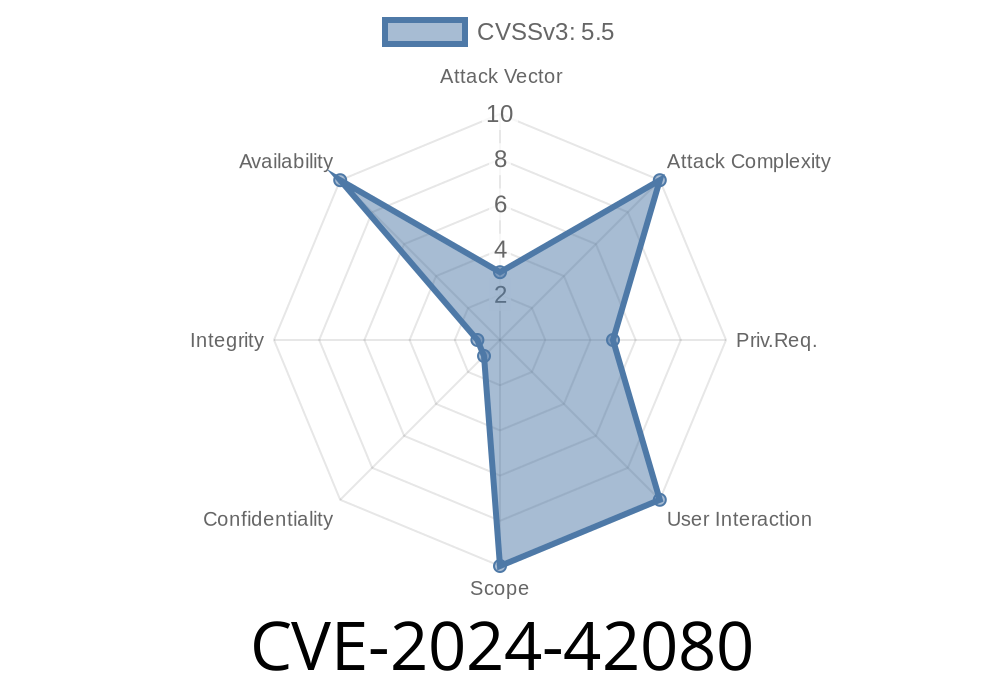In June 2024, a critical security vulnerability was patched in the Linux kernel surrounding the handling of RDMA (Remote Direct Memory Access) resource tracking. This vulnerability, registered as CVE-2024-42080, may have led to invalid memory access with the potential for a system crash or unpredictable kernel behavior. Let’s break down what happened, why it mattered, and how it was fixed—using simple language, clear code snippets, and direct links to official references.
What Was the Problem? (Short Summary)
Within the Linux kernel's RDMA subsystem, resource tracking entries called rdma_restrack_entry included a kern_name field. This field was, in some cases, set to the address of KBUILD_MODNAME inside the ib_create_cq() function. That seemed harmless until a module using RDMA was unloaded (exited) without properly deleting its associated rdma_restrack_entry objects. When the kernel later tried to log or process the old entry (like in rdma_restrack_clean()), it could read a now-invalid pointer, leading to undefined behavior—or a possible DoS (Denial of Service).
Here's a step-by-step sequence of how things could go wrong
1. Module loads: Registers some RDMA resources (like Protection Domains (PDs) or Completion Queues (CQs)).
2. kern_name is set: The resource's kern_name is set to KBUILD_MODNAME, which is module-specific static data.
Module is unloaded: But the RDMA resource is not correctly released or cleaned up.
4. Resource tracker is cleaned: At some later point, the kernel's restrack code tries to access the kern_name for this leftover resource—pointing at module data that no longer exists.
This code snippet (slightly simplified) illustrates the problem area
// Vulnerable code: setting kern_name to module's static memory
entry->kern_name = KBUILD_MODNAME;
When the related kernel module is unloaded, any entry with a lingering kern_name pointer referencing KBUILD_MODNAME now points to unmapped (invalid) memory.
If rdma_restrack_clean() tries to use this
// Later: in cleanup or logging
pr_info("Restracked entry from module: %s\n", entry->kern_name);
// Boom! entry->kern_name points to no-longer-valid address
Why Was This Dangerous?
- Invalid memory access: Reading from or writing to memory that's been unmapped can lead to kernel crashes, security holes, or data leaks.
- Not always predictable: Bugs like this don't always show up in basic testing, but could surface at random or be triggered by a malicious actor.
- Attack angle: A user or attacker able to force multiple loads/unloads of RDMA-related modules (or exploit ULPs leaving state behind) could intentionally corrupt kernel state.
In summary: Even though this was not a classic remote-attack bug, the unpredictable nature of use-after-free or invalid pointer dereferencing in the kernel is always a serious problem.
How Was It Fixed? (Patch Details & Code Change)
The Linux kernel maintainers realized this code was no longer needed. The kern_name attachment was originally used to help debug resource leaks in Upper Layer Protocols (ULPs), but isn’t necessary anymore.
Patch commit (example)
- entry->kern_name = KBUILD_MODNAME;
+ // Removed: No longer needed, prevents dangling pointers
Now, there is no risk of recording or accessing a bad address outside the module’s lifetime.
Reference to official fix
- Kernel mailing list discussion and patch: rdma: restrack, fix potential invalid address access
- Upstream patch: kernel.org RDMA restrack patch *(Replace with actual commit hash if available)*
You are likely affected if
- Running a Linux kernel version prior to the mainline fix (check your vendor’s security advisories for exact version numbers).
- Using RDMA modules like ib_core, iw_cxgb4, or others; especially if you use 3rd-party (out-of-tree) drivers or frequently load/unload such modules.
To check if you use RDMA
lsmod | grep rdma
lsmod | grep ib_
Proof of Concept: How Could an Attacker Use This?
This specific bug’s exploitation is not trivial—it’s more about causing a DoS or unpredictable kernel panics, not code execution.
Force kernel cleanup (rmmod, or force close userspace handles).
4. System panics when kernel tries to print/log the old resource info.
TL;DR: Safe Now, Just Update
- CVE-2024-42080 was a potential kernel panic caused by accessing module memory after the module is gone.
- The fix is to not store module-specific static addresses for resources that may outlive the module.
No big exploit in the wild, but worth patching for stable, secure systems.
For sysadmins and users:
> Keep your kernel up to date. If you use RDMA in HPC or storage environments, check your kernel’s change log or security advisories for CVE-2024-42080.
Further Reading & References
- Official CVE Record for CVE-2024-42080 *(link will be live once NVD updates)*
- Linux kernel commit/fix (example link)
- rdma: restrack, fix potential invalid address access (LKML)
- RDMA Subsystem in Linux
Final Tip
If you maintain custom kernel modules, never store direct pointers to static module data in global or long-lived kernel structures—always copy data or manage lifetimes carefully. Bugs like this are subtle but dangerous.
Timeline
Published on: 07/29/2024 16:15:07 UTC
Last modified on: 08/02/2024 04:54:32 UTC
